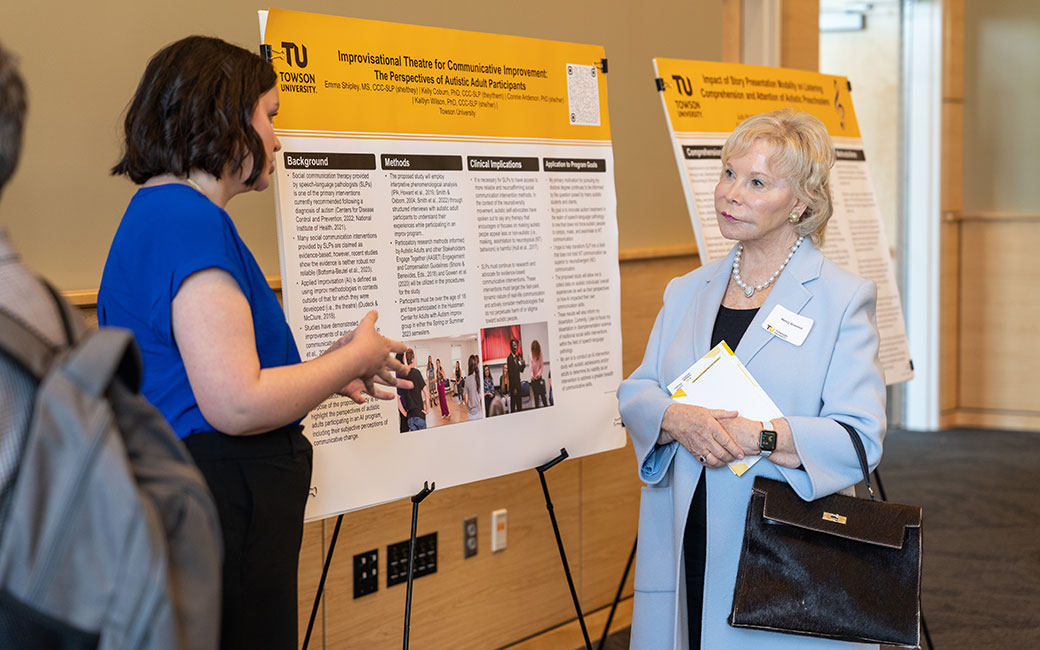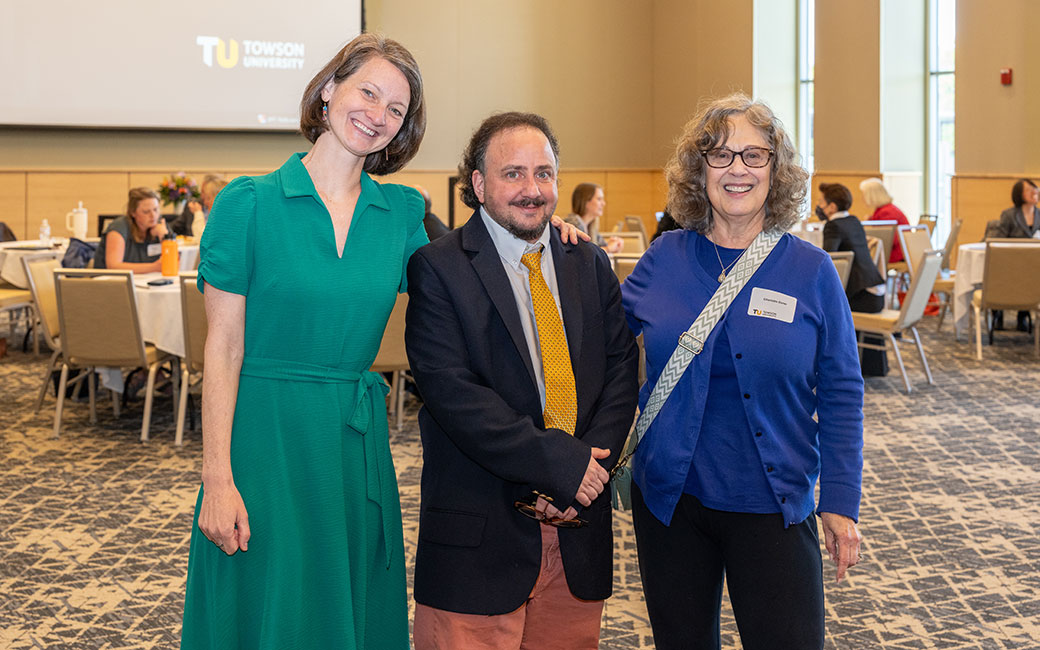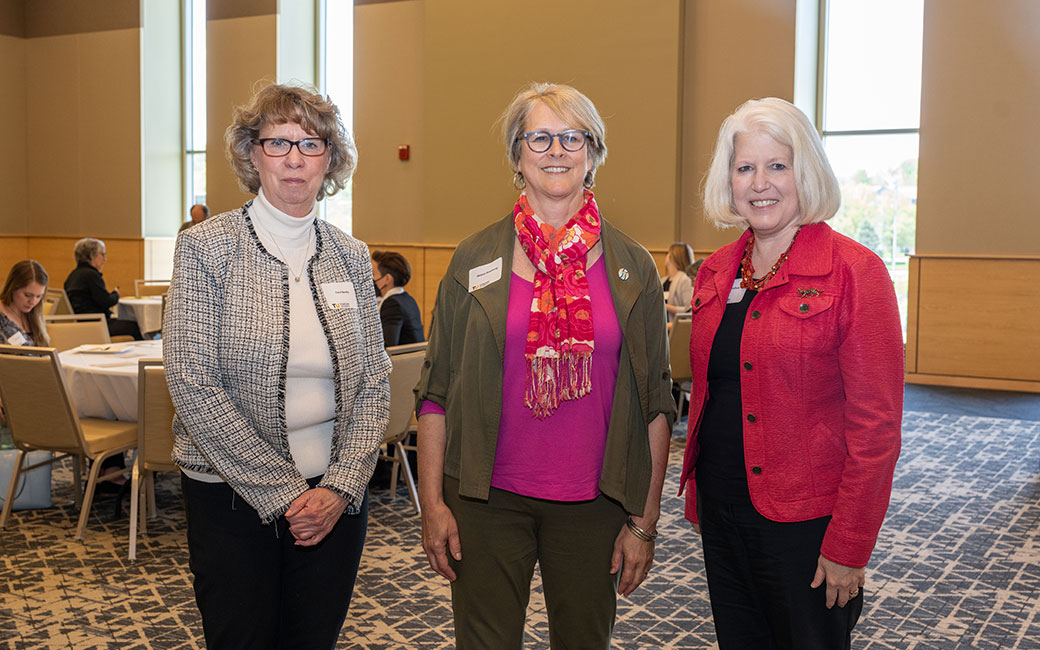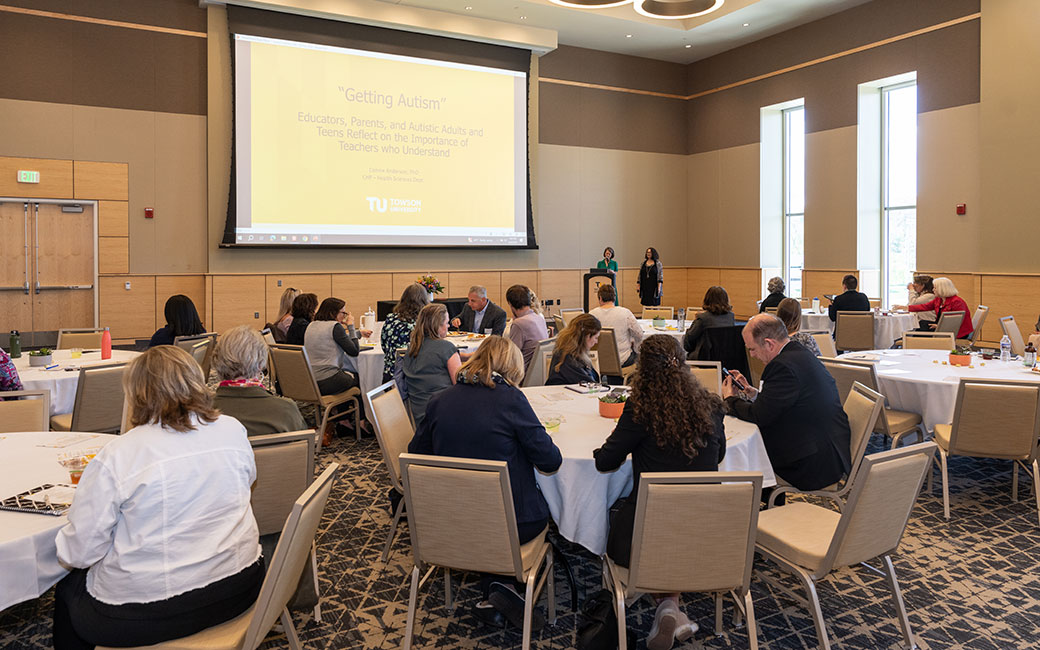
TU hosts collaborative research forum for change
TU Autism Summit brought together scholars, practitioners, researchers, students interested in advancing autism studies
By JAMIE ABELL on April 25, 2024
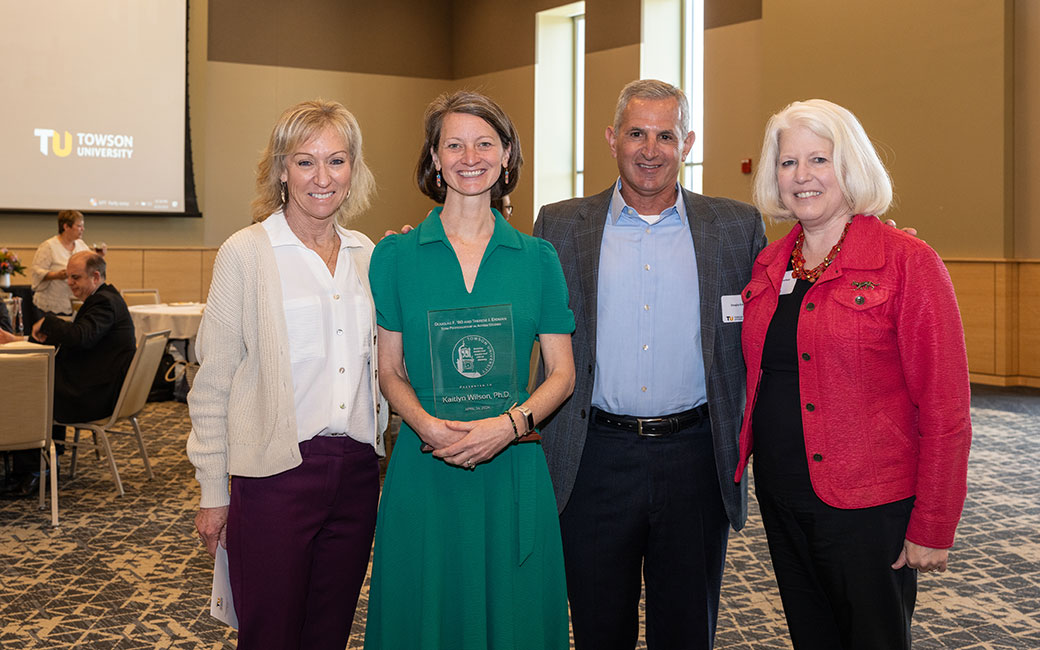
Towson University’s College of Health Professions hosted the first annual Autism Summit on Wed., April 24, in the University Union ballroom. Sponsored by the new autism studies doctoral program, this event united leading experts from the greater Baltimore community dedicated to advancing autism research—including TU faculty and students. Special guests filled the audience, including Nancy Grasmick, TU presidential scholar; Melissa Rosenberg, executive director of the Howard County Autism Society; Rebecca Landa, vice president at the Kennedy Krieger Institute; and Carol Beatty ‘75, secretary of Maryland’s Department of Disabilities and TU alumni recognition award winner.
“This event showcased the breadth of autism research happening at Towson University, with students, faculty and other partners in the community,” says Lisa Plowfield, dean of the College of Health Professions. “This event provided an opportunity for students and faculty from across the university to learn and collaborate, hopefully generating more ideas and excitement for future research.”
Throughout the event, attendees engaged in scholarly discussions about new and current autism research. Autism studies doctoral students showcased their research posters, highlighting their initiatives aimed at enhancing understanding and support within the autism community, including:
- Case Study Exploration of a Medicaid Home and Community Based Services Autism Waiver (Nicole Herman)
- The Experiences of Direct Support Professionals Working with Autistic Adults: an Exploratory Study (Stephanie M. Colón)
- Improvisational Theatre for Communication Improvement: the Perspectives of Autistic Adult Participants (Emma Shipley)
- Impact of Story Presentation Modality on Listening Comprehension and Attention of Autistic Preschoolers (Judy Martini)
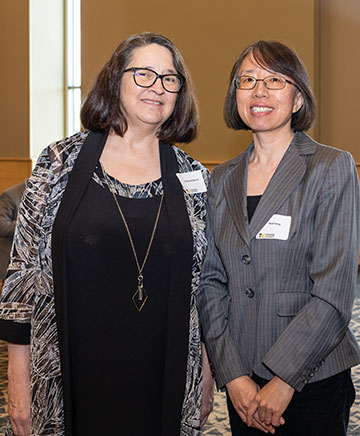
Inspirational keynote speakers Zosia Zaks and Towson faculty Connie Anderson and Heidi Feng offered their expert perspectives and guided exploration of critical issues and innovative solutions in autism. Feng noted how important this summit is for TU, saying, “It’s great for TU to connect the dots of different teams across campus. We can all meet each other and learn what others are doing—sharing resources and creating collaboration can significantly boost research.”
In fact, her collaborative research projects have brought together people from the College of Health Professions, College of Education and the Fisher College of Science & Mathematics. She focused her remarks on improving health care services for individuals with autism through information technology. Inspired by a real-world challenge of effectively treating people with autism at doctors’ offices and emergency rooms, Feng’s research underpins the Comprehensive Autism Resource Environment (CARE) app.
Learn more about Heidi Feng's research
Goal
In collaboration with Jennifer Kouo, at the Johns Hopkins School of Education, and Katherine Tang, computer and information sciences faculty at TU, Feng sought to better serve children with autism and their caregivers during medical visits through effective communication support and easily accessible training materials.
Research overview
The research began with an understanding that people with autism tend to experience substantial challenges during emergency room visits due to sensory intensity, unpredictability and difficulty in communication.
Feng and her team conducted several visits to the emergency department of the Johns Hopkins Children Center to study the social and physical environment of the medical space. They conducted interviews with key roles of the medical team, surveyed family with children with autism and led focus groups in local ASD communities. Through these need-finding activities, they identified major functions and features of the proposed solution: the CARE app.
The CARE app educates young children going to the emergency room or another doctor's office through picture-based social stories, so they become more familiar with potential procedures. The app also helps facilitate communication between the health care team and patient, surveys the patient and family so the health care team can better understand the children’s needs and provides training materials to the health care team to learn more about autism in general.
Next steps
Feng’s team has completed a small-scale field evaluation of the app. They will continue to evaluate and adjust the app as more data is collected. In addition, the team uncovered another challenge: There’s a limited amount of data from the neurodiverse population and a lack of support for evidence-based practice (EBP) in health care and education. The team has embarked on another research journey to build an AI-based solution that can help generate data about people with autism and recommend effective EBP intervention.
This will all be in a call-out box to condense the material (from a user experience perspective)
Connie Anderson focused her remarks on the importance of teachers understanding autistic students. In her interviews, “people kept talking about their experiences in schools, from people who were wonderful to things that went terribly wrong. There are teachers that get it, and teachers that don’t,” said Anderson at the event.
Learn more about Connie Anderson's research
Goal
Connie Anderson sought to understand more about the experiences people with autism have in schools and how their families and teachers affected them. She wanted to gain insight into what helps one teacher understand these students while others do not.
Research overview
The research began with a focus on students transitioning to a career or adult services, but participants spontaneously shared numerous experiences they had in schools, so Anderson transitioned the focus to that aspect. Teachers who understood had more than knowledge. They had other qualities that made them successful, such as training, empathy and openness.
Overall, Anderson found that teachers who understood made a major difference in the lives of these students and their families.
Next steps
Anderson will focus less on dyadic relationships within the schools (student–teacher, parent–teacher, teacher–teacher) and focus instead on larger, systemic issues, such as how diagnosis happens in schools (and how it is delayed), what happens at individualized education program (IEP) meetings and how school culture affects autistic students’ sense of isolation or belonging. Once this research is complete, she will have an in-depth understanding of the school experiences of students on the spectrum and how these can be improved at multiple levels.
Feng and Anderson are excited about the future of autism research at TU and beyond. “The research we are doing at TU, especially with the unique and truly interdisciplinary Ph.D. program, can improve the quality of life and outcomes for children, teens and adults on the autism spectrum...and their families,” says Anderson.
“Dean Plowfield’s valuable support to cross-campus collaboration has made a tremendous difference in advancing interdisciplinary research,” adds Dr. Feng. “We get to work with students and faculty from other colleges who bring in completely new perspectives and expertise. It’s a fantastic learning experience.”
During the event, Melanie Perreault, provost and executive vice president at TU, announced the appointment of an inaugural term professor for the the Douglas F. ’80 and Therese J. Erdman Term Professorship in Autism Studies, awarded to Dr. Katilyn Wilson. The professorship signals the high impact of Towson University’s interest in autism research and inclusive excellence and is the first funded professorship in the College of Health Professions.
“Thank you to the Erdmans. This is really an acknowledgement of their support of Towson University and their support of autism research and everything we’re doing here. I’m honored to be the recipient and to be part of it all,” said Dr. Wilson.
Get more information on the autism studies doctoral program
Autism Studies PhDLearn about research initiatives at Towson University
Research Initiatives
